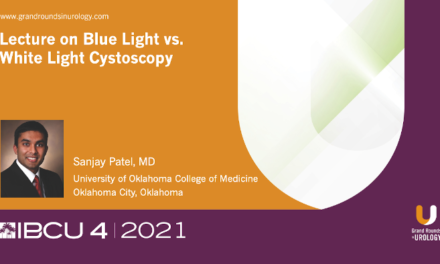Jean H. Hoffman-Censits, MD, presented “Targeted Therapy Combined with Immune Checkpoint Therapy: Is This the Wave of the Future?” at the 6th International Bladder Cancer Update on November 20, 2022, in Scottsdale, Arizona.
This content is available free to the GRU Community. Login or create an account to view it.
How to cite: Hoffman-Censits, Jean H. “Targeted Therapy Combined with Immune Checkpoint Therapy: Is This the Wave of the Future?” November 2022. Accessed Jul 2025. https://grandroundsinurology.com/targeted-therapy-combined-with-immune-checkpoint-therapy-is-this-the-wave-of-the-future/
Targeted Therapy Combined with Immune Checkpoint Therapy: Is This the Wave of the Future? – Summary
Dr. Jean H. Hoffman-Censits explores the potential of combining targeted therapy with immune checkpoint therapy to treat bladder cancer. She provides a thorough examination of the scientific rationale and clinical evidence supporting this approach to cancer treatment.
Dr. Hoffman-Censits begins by explaining the mechanisms of targeted therapies, which are designed to interfere with specific molecular pathways crucial for tumor growth. She emphasizes the precision of these therapies in attacking cancer cells while sparing normal tissues, thereby reducing side effects and improving patient outcomes.
She then delves into the principles of immune checkpoint therapy, which works by blocking the proteins that prevent immune cells from attacking cancer cells. Dr. Hoffman-Censits highlights the significant success of immune checkpoint inhibitors in treating various cancers, including bladder cancer, and discusses the limitations and resistance mechanisms, such as rash and neuropathy, that sometimes arise with monotherapy.
The core of Dr. Hoffman-Censits’ presentation focuses on targeted therapies and immune checkpoint inhibitors. She explains how combining these treatments can potentially overcome resistance mechanisms and enhance therapeutic efficacy. She presents data from recent clinical trials and studies demonstrating the improved outcomes with this combination approach, including increased overall survival rates and progression-free survival.
Dr. Hoffman-Censits also addresses the challenges and considerations in implementing this combination therapy. She discusses the importance of patient selection, identifying biomarkers that can predict response, and managing the potential increased toxicity. She emphasizes the need for ongoing research and clinical trials to refine these strategies and develop personalized treatment plans that maximize benefits while minimizing risks.
About the 6th International Bladder Cancer Update:
The International Bladder Cancer Update (IBCU) is a CME conference focused on the diagnosis and treatment of bladder cancer. The conference offers medical professionals an opportunity to listen to updates from, and interact with, expert international faculty to improve knowledge and determine best treatment practices to improve patient outcomes. IBCU encompasses expert lectures, interactive discussions, a panel roundtable, debates, and case presentations. It is physician-led, multi-supported, and designed for urologists, urologic oncologists, and other healthcare professionals involved in the treatment of bladder cancer.
For further educational activities from this conference, visit our collection page.
ABOUT THE AUTHOR
Jean Hoffman-Censits, MD, is Associate Professor of Medical Oncology and Urology at The Johns Hopkins University School of Medicine. Dr. Hoffman-Censits earned her medical degree at The Sidney Kimmel Medical College at Thomas Jefferson University, where she completed her internal medicine residency and chief residency. She completed her oncology training at Fox Chase Cancer Center, then returned to Jefferson as a genitourinary (GU) medical oncologist, leading their multidisciplinary GU oncology clinic. She joined the Johns Hopkins Greenberg Bladder Cancer Institute in 2018 as the co-leader of the Women’s Bladder Cancer Program and Upper Tract Urothelial Cancer (UTUC) Multidisciplinary Clinic.





